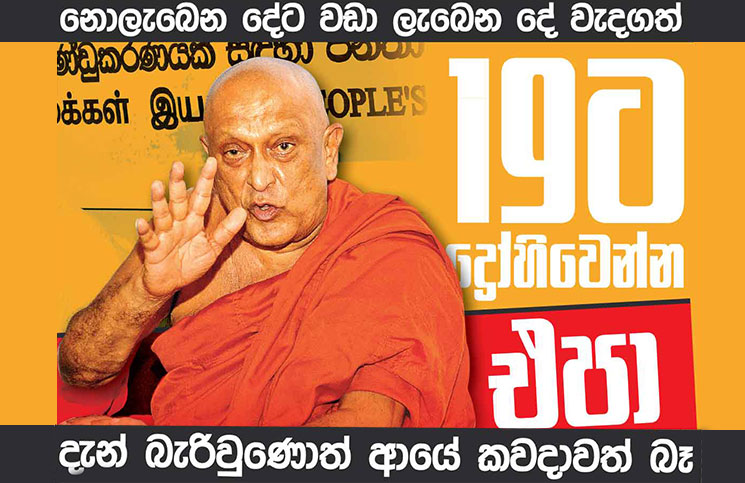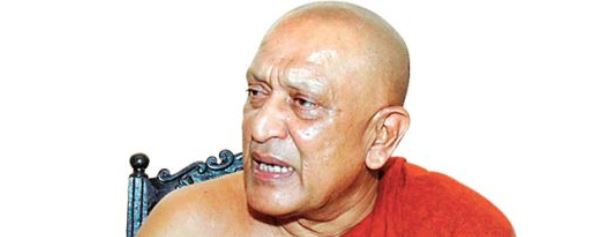[Ven. Maduluwawe Sobitha Thera]
With repeated election victories since 2005, the Rajapakse regime had shown signs of being an unstoppable force by early 2012.
Finding a leader to arrest the rapid authoritarian trend was the biggest challenge for those who fought for democracy in Sri Lanka. The regime too, by hook or by crook, successfully sidelined almost all such potential contenders and many frustrated and hopeless democracy activists either left the country or functioned in a low key manner due to safety concerns. Since the pro-peace and pro-democracy voice was suppressed, the looters and the thugs enjoyed a monopoly of governance of this country.
The assassination of popular politician and Presidential Advisor, Bharatha Lakshman Premachandra by a mob led by a government Member of Parliament sent shock waves throughout society since the incident exposed many evil aspects of the then regime.
The government was seen more vividly as the sponsor of thuggery and gun culture while the drug mafia openly dominated Sri Lankan society. No one dared to open one’s mouth against certain powerful individuals and these unsavoury trends in society.
Funeral
But at the funeral of the slain Premachandra, there was a person who had the back bone to publicly expose the number of drug dealers operating in Premachandra’s home electorate of Kolonnava itself.
The same speaker openly criticized the higher echelons of the regime for nurturing this new culture in Sri Lanka. The speaker was none other than the Ven. Maduluwawe Sobitha Thera, Nayaka Thera of the Kotté Naga Vihara. In his speech, this much-loved Buddhist monk, famous for his social activism, revealed that there were an estimated 450 drug dealers operating in Kolonnawa and also made a strident call for an end to what he branded as the “evil” that was the Executive Presidency.
His voice reverberated throughout society that day.
This tragic incident paved the way for the writer to approach the venerable monk to initiate a discussion for a broader platform for like-minded people to gather and to start a dialogue against the obnoxious executive presidency. After several rounds of discussions, the game-changing organization in the recent history of our motherland, Saadarana Samaajayak Sandaha Jathika Vyaapaaraya or the National Movement for Social Justice (NMSJ), was formed. The rest is history – unfolding even as I write.
The inaugural press conference was held at the National Library Services Board auditorium in Colombo in early 2012 and it was a well-attended forum. Within a very short period of time, the NMSJ, led by the Ven. Sobitha, was able to bring representatives from a range of sectors in society on board.
Political party leaders, political activists, activist clergy, civil society leaders, artistes, trade union activists, media groups, farmers and, professionals including lawyers, doctors etc, became actively involved.
Although a broad platform was formed around multiple concerns, the regular discussions focused on two major challenges.
The first major challenge was to formulate an attractive and marketable slogan for the widest popular consensus while the second challenge to find a potential common opposition candidate who could take on the powerful Mahinda Rajapakse.
Unanimity
There was unanimity over using the abolition of the Executive Presidency as the main slogan since it would attract almost all the main political actors and constituencies. This idea, once adopted and campaigning begun, was castigated by sections loyal to Rajapakse as a ‘single issue’ campaign.
They laughed at this slogan and said that the NMSJ would never be able to convince the rural masses as they had no interest in the abolition or otherwise of the Presidential system.
The second challenge became the most crucial one because the Sri Lankan people had been badly let down during the past as successive presidential candidates got elected with the promise to abolish the Presidency but never fulfilled those pledges. Rather, they either attempted to extend their presidential tenure or acted to further strengthen their executive powers by bringing more amendments such as the infamous 18th Amendment to the Constitution. Since there was no immediate unanimity as to who should be the common candidate, the NMSJ and Ven. Sobitha Thera strategically decided to postpone the naming of a Common Candidate only when the presidential election was called.
Thus, while much consensus-building continued on the numerous issues of concern, there was a public ‘guessing game’ over the elusive common candidate that continued until the very last moment. Interestingly, some members proposed the name of Sobitha Thero himself as everyone trusted him as a person who would implement the abolition.
This writer was amazed when this idea was first mooted by a non-Buddhist member of the NMSJ. As usual, Sobitha Thera was targeted by Rajapakse loyalists.

The venerable monk was branded by the pro-Mahinda propagandists as a Sri Lankan ‘Khomeini’, deliberately using the Western media distortions of the great Iranian revolutionary Imam. But the Ven. Sobitha’s determination was never blunted by the barrage of intimidation. Certain media personalities used abusive hate language to tarnish the image of the Monk. Two mysterious road accidents took place during that period targeting Sobitha Thera’s vehicle. Fortunately, he was unscathed.
Threatening telephone calls with death threats became a regular phenomenon. He was not shaken. His life was virtually in danger until January 9th. Though the NMSJ did not announce a particular common candidate, possible names were thrown up in the regular planning meetings. But the two concerns, namely, the chances of winning against Rajapakse and, fulfilling the abolition pledge after electoral victory, were the focus of the serious strategy deliberations. When the name of Maithripala Sirisena finally emerged, there was not much hesitation amongst the members of the NMSJ with regard to the two main concerns they had. Today, Sri Lankan political history has turned in a new, hopeful, direction. As our Movement sees it, we have found a man who willingly gave up enormous powers vested in his office for the betterment of the country and its people.
It was the greatest sacrifice in the recent political history of our country. It has been so elusive these past few decades that no one quite believed that this would actually happen until the 19th Amendment was, finally, passed.
The two historic characters, Ven. Nayaka Thera and the President, tirelessly campaigned until the very last moment.I see this as the emergence of two major political characters of our time.
I see the President’s approach as being similar to South African leader Nelson Mandela. Mandela, having spent 27 years of his life in prison, pardoned all those responsible for heinous crimes of governmental repression and initiated a dialogue with the white Apartheid government to give freedom and equality to the South African people. President Maithripala, too, is setting aside petty political agendas and working tirelessly with a set of opportunistic Parliamentarians who almost destroyed him in the past to bring back democracy to this country.
The role played by Sobitha Thero, was, and is, for me, similar to that of Ven Kudaapola Unnaanse who fought and died for the freedom of our motherland during the rebellion of 1848.
When Sri Lankan history is written, these two names will definitely have a special place as two personalities who changed the political structures and set our political culture on a new, civilized, path.
We, as a nation should salute them for their selfless labour and the risks they took on behalf of people of this country. Finally, we should salute all those who campaigned against the executive presidency and who shed blood, sweat and tears since its introduction in 1978 and until the 19th Amendment was passed.
The 19th Amendment has dramatically changed Sri Lanka’s political structure.
But it was a movement of people of various walks of life, all concerned citizens, who made a start to this process of drastic change a few years before, not knowing – in the face of authoritarian demagoguery and repression – when that change would come about.
Lawyer and political activist Ravi Jayawardena is the convenor of the National Movement for Social Justice founded by the Ven. Maduluwawe Sobhitha Nayaka Thera which provided the visionary platform for the campaign to end the dictatorial executive presidency and revive a democratic and civilized political ethos in the country.
Here, Jayawardena, who once ably served as the country’s youngest Commissioner of Prisons, recalls the origins of this movement which inspired the nation and challenged tyranny.
SO
